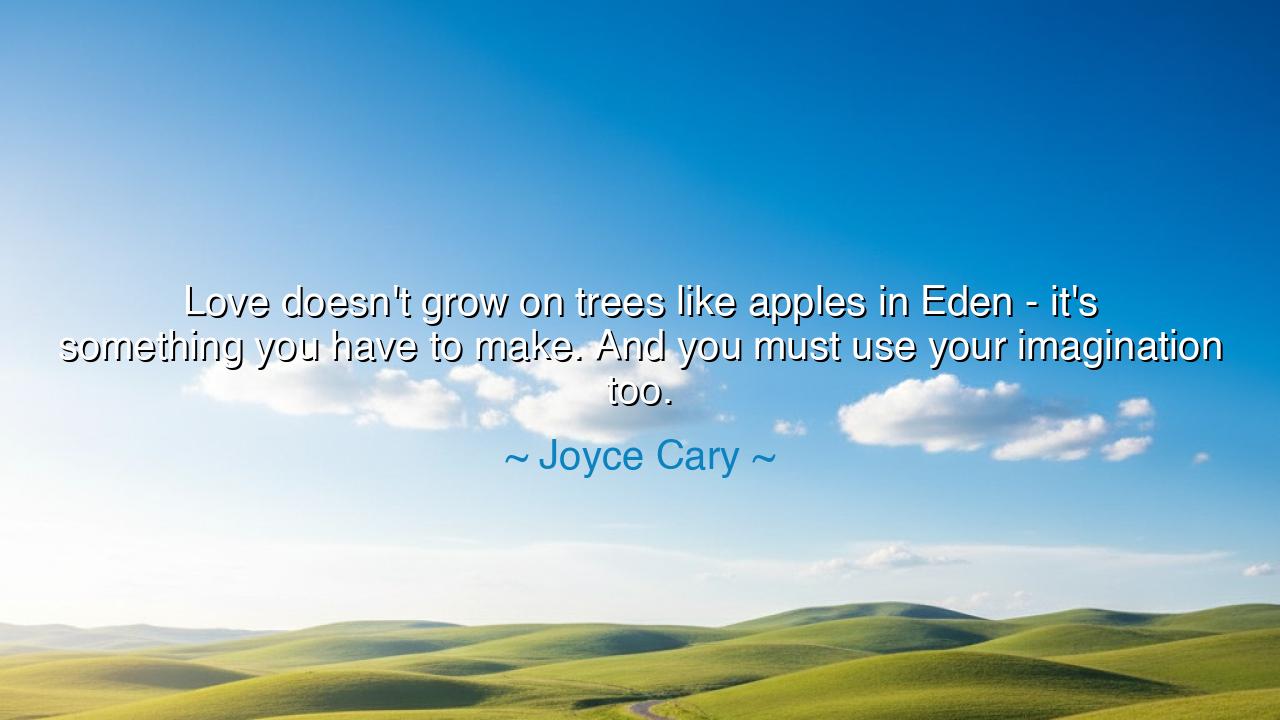
Love doesn't grow on trees like apples in Eden - it's something
Love doesn't grow on trees like apples in Eden - it's something you have to make. And you must use your imagination too.






"Love doesn't grow on trees like apples in Eden - it's something you have to make. And you must use your imagination too." These words from Joyce Cary remind us of the truth that love—though often idealized as a simple, natural gift—is not something that simply appears in our lives without effort. Love is not like an apple in the Garden of Eden, plucked easily from a tree, but something that must be created through dedication, nurturing, and the imagination to see beyond the surface of life. Cary’s reflection suggests that love requires the will to craft it, to make it real, and the creativity to envision it in all its depth and complexity. It is not passive, but active—a process of continual growth, adaptation, and deepening, something that must be fostered through effort and vision.
In the ancient world, love was often viewed as a force both divine and earthly, something that both transcended human experience and yet rooted itself in the physical world. The Greeks spoke of several forms of love, from eros (romantic love) to agape (selfless love). While eros was often depicted as a powerful force that could overcome the gods themselves, it was also a force that required care and attention to thrive. The ancient myth of Pygmalion, the sculptor who fell in love with a statue he created, demonstrates that love is not something that just happens, but something that must be cultivated. Pygmalion’s love for his creation is brought to life through his devotion, his imagination, and his ability to see beauty where others did not. In a similar manner, Cary’s words remind us that love, though a profound force, must be actively nurtured and brought into existence through thought and creativity.
Consider the legendary story of Orpheus and Eurydice, a tale of love so deep that Orpheus ventured into the very depths of Hades to retrieve his beloved Eurydice. Yet, his failure to look back during their ascent, breaking the condition that would have allowed her to return, is a tragic reminder that love cannot simply be taken for granted. It must be cultivated through patience, commitment, and a constant, imaginative vision of the future. Orpheus’s attempt to bring his love back to life was not mere blind action—it was driven by the imagination of a future where love could transcend even death. Yet his failure teaches us that love requires careful attention and a clear vision of what it means to truly nurture something precious, something that must be created and not simply expected.
In the modern world, the creation of love takes on new forms, as we navigate complex relationships shaped by social expectations, modern conveniences, and fast-paced lives. Yet, even today, the truth of Cary’s words remains powerful. True love cannot exist in a vacuum or as a fleeting attraction. It requires effort, patience, and above all, the ability to see beyond the immediate. Artistic relationships, such as those between Virginia Woolf and Vita Sackville-West, or Frida Kahlo and Diego Rivera, were fraught with difficulties, but they were also driven by an ongoing process of creative engagement, where both individuals had to reimagine their love over and over again to make it work amidst the challenges they faced. These relationships remind us that love is not static, but something that must be continuously reimagined and recreated, in all its joy and pain, with the will to endure.
Cary’s assertion also speaks to the role of imagination in sustaining love. In our daily lives, we may face difficulties, misunderstandings, and even heartache. Yet it is through imagination—the ability to see beyond the current frustration and envision the future of a relationship—that love grows. This is the power of hope and vision. The relationship between Penelope and Odysseus, for instance, is one of unwavering love that survives years of separation. Penelope, despite the temptations of other suitors, continues to hold on to the vision of her husband’s return, using her imagination to craft a narrative in which they will be reunited. In doing so, she sustains the love that binds them, showing that love is not just an emotional reaction, but an active process of imagination and commitment.
The lesson we can take from Cary’s wisdom is one of purposeful creation and dedication. Love is not a passive emotion that simply arrives on its own—it must be actively shaped, nourished, and reimagined. The imagination is the tool we use to see beyond the immediate frustrations or limitations and to envision a future in which love thrives. To love deeply is to understand that love requires work—it is something that must be created over time, through thought, effort, and the willingness to keep imagining new ways to nurture and deepen that love.
In our own lives, we can practice this by intentionally investing in the relationships that matter to us. Whether with family, friends, or partners, we must choose to use our imagination to see beyond current struggles and envision the potential for growth and connection. Love, in all its forms, is an ongoing creation—one that requires not only emotional commitment but imaginative effort. Let us, then, seek to cultivate love, not as a fleeting emotion, but as a living, evolving creation, one that we must tend to with care, dedication, and the full power of our imagination. Through this, we will ensure that love remains a force that shapes and enriches our lives, just as it has for generations before us.






AAdministratorAdministrator
Welcome, honored guests. Please leave a comment, we will respond soon